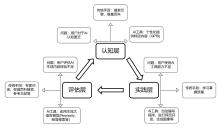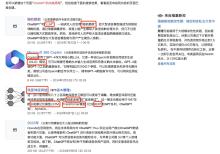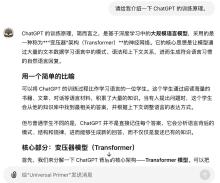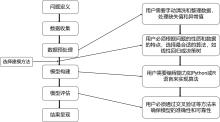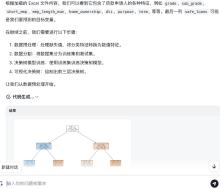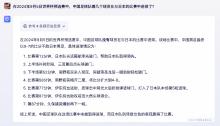| 1 |
杜华, 杜楠楠. 我国智能素养研究热点及发展趋势——基于共词分析的可视化研究[J]. 教育信息技术, 2022(6): 44-47.
|
|
DU H, DU N N. Research hotspots and development trends of intelligence literacy in China - Visualization research based on co-word analysis[J]. Educational information technology, 2022(6): 44-47.
|
| 2 |
闫志明, 唐夏夏, 秦旋, 等. 教育人工智能(EAI)的内涵、关键技术与应用趋势——美国《为人工智能的未来做好准备》和《国家人工智能研发战略规划》报告解析[J]. 远程教育杂志, 2017, 35(1): 26-35.
|
|
YAN Z M, TANG X X, QIN X, et al. The connotations, key technologies and application trends of educational artificial intelligence(EAI): Interpretation and analysis of the two reports entitled "preparing for the future of artificial intelligence" and "the national artificial intelligence"[J]. Journal of distance education, 2017, 35(1): 26-35.
|
| 3 |
陈颖博, 张文兰. 国外教育人工智能的研究热点、趋势和启示[J]. 开放教育研究, 2019, 25(4): 43-58.
|
|
CHEN Y B, ZHANG W L. Hotspot, trend, and enlightenment of educational artificial intelligence research abroad[J]. Open education research, 2019, 25(4): 43-58.
|
| 4 |
北京部分中小学校开设人工智能课: 小粉丝迷上前沿新知[EB/OL]. [2024-04-23].
|
| 5 |
谭礼园, 涂涛, 李轩涯, 等. 基于EasyDL平台的小学AI课程教学设计与实践[J]. 计算机教育, 2022(7): 12-16.
|
|
TAN L Y, TU T, LI X Y, et al. Teaching design and practice of AI course in primary schools based on EasyDL platform[J]. Computer education, 2022(7): 12-16.
|
| 6 |
8岁小孩哥上手用AI制作游戏, 全程2小时, 引来50多万人围观[EB/OL]. [2024-04-23].
|
| 7 |
“比肩”ChatGPT之父奥特曼, 中国“AI教父”李一舟靠卖课年入 5000万[EB/OL]. [2024-04-23].
|
| 8 |
黄如花, 石乐怡, 吴应强, 等. 全球视野下我国人工智能素养教育内容框架的构建[J]. 图书情报知识, 2024, 41(3): 27-37.
|
|
HUANG R H, SHI L Y, WU Y Q, et al. Constructing content framework for artificial intelligence literacy instruction in China from a global perspective[J]. Documentation, information & knowledge, 2024, 41(3): 27-37.
|
| 9 |
全市 103所学校获评智慧校园示范校 AI进教室 课堂大变样[EB/OL]. [2024-04-23].
|
| 10 |
北京: 明年大中小学普遍开展人工智能应用[EB/OL]. [2024-04-23].
|
| 11 |
要大规模扫除青壮年人工智能盲, 提高全民人工智能素养[EB/OL]. [2024-04-23].
|
| 12 |
2024年中国AI教育行业研究报告[EB/OL]. [2024-04-23].
|
| 13 |
教育部发布 4项行动助推人工智能赋能教育[EB/OL]. [2024-04-23].
|
| 14 |
申小玲. 整合技术手段 提升英语素养——浅谈多媒体技术下的初中英语教学[J]. 新课程导学, 2015(10): 35.
|
|
SHEN X L. Integrating technical means to improve English literacy - On junior high school English teaching under multimedia technology[J]. New course introduction, 2015(10): 35.
|
| 15 |
赵艳芳. 现代教育技术在初中语文教学中的应用[J]. 家长, 2020(15): 48, 50.
|
|
ZHAO Y F. The application of modern educational technology in junior middle school Chinese teaching[J]. Parents, 2020(15): 48, 50.
|
| 16 |
GUPTA V, DIXIT A. Recent query reformulation approaches for information retrieval system - A survey[J]. Recent advances in computer science and communications, 2023, 16(1): 10-25.
|
| 17 |
SHARMA S, PANDA S P. Efficient information retrieval model: Overcoming challenges in search engines-an overview[J]. Indonesian journal of electrical engineering and computer science, 2023, 32(2): 925.
|
| 18 |
刘奕伶. 环境数据开放视阈下的公众参与环境治理——基于对国内三市政府环境数据开放现状的维度分析[J]. 安徽行政学院学报, 2018, 9(4): 106-112.
|
|
LIU Y L. New opportunities for public participation in environmental governance: Open government environmental data - An analysis of the dimensions of the openness of environmental data in China's 3 cities[J]. Journal of Anhui administration institute, 2018, 9(4): 106-112.
|
| 19 |
HONG K C, SHIBGHATULLAH A S BIN. Decoding ERP training for non-technical users: A novel algorithm-driven framework for enhanced training effectiveness[C]//2024 IEEE 9th International Conference for Convergence in Technology (I2CT). Piscataway, New Jersey: IEEE, 2024: 1-5.
|
| 20 |
VALVERDE-REBAZA J, GONZÁLEZ A, NAVARRO-HINOJOSA O, et al. Advanced large language models and visualization tools for data analytics learning[J]. Frontiers in education, 2024, 9: 1418006.
|
| 21 |
关真, 孟聿. 信息-动机-行为模式在老年起搏器植入术患者康复护理中的应用研究[J]. 中国医药指南, 2016, 14(23): 253-254.
|
|
GUAN Z, MENG Y. Application of information-motivation-behavior model in rehabilitation nursing of elderly patients with pacemaker implantation[J]. Guide of China medicine, 2016, 14(23): 253-254.
|
| 22 |
吴先华, 蔡正平, 郭际. 产业集群中本地知识溢出(LKS)问题的西方文献综述[J].科技管理研究, 2008, 28(1): 242-244.
|
|
WU X H, CAI Z P, GUO J. A review of western literature on local knowledge spillover (LKS) in industrial clusters[J]. Science and technology management research, 2008, 28(1): 242-244.
|
| 23 |
斯图亚特·霍尔, 孔智键. 马克思论方法: 读1857年《导言》[J]. 山东社会科学, 2016(7): 5-23.
|
|
STUART H, KONG Z J. Marx's theory of method: Reading introduction in 1857[J]. Shandong social sciences, 2016(7): 5-23.
|
| 24 |
董正信, 周博. 利率对消费、投资、股价、汇率影响的实证研究[J]. 河北大学成人教育学院学报, 2007, 9(4): 104-106.
|
|
DONG Z X, ZHOU B. The empirical research of interest rates' influences to consuming, investment, stock price and rate of exchange[J]. Journal of adult education college of Hebei university, 2007, 9(4): 104-106.
|
| 25 |
GENYS M, MARIJUS V. Veiksnių poveikis žinių darbuotojų polinkiui naudotis generatyviuoju dirbtiniu intelektu[D]. Vilnius: Vilniaus Universitetas, 2024.
|
| 26 |
SIREGAR K E. Increasing digital literacy in education: Analysis of challenges and opportunities through literature study[J]. International journal of multilingual education and applied linguistics, 2024, 1(2): 10-25.
|
| 27 |
SIAHAAN R D R, SIRAIT G. The importance of digital literacy in the era of society 5.0[J]. Indo-MathEdu intellectuals journal, 2023, 4(3): 1734-1742.
|
| 28 |
SAPUTRA I, ASTUTI M, SAYUTI M, et al. Integration of artificial intelligence in education: Opportunities, challenges, threats and obstacles. A literature review[J]. The Indonesian journal of computer science, 2023, 12(4): 10-25.
|
| 29 |
CASAL-OTERO L, CATALA A, FERNÁNDEZ-MORANTE C, et al. AI literacy in K-12: A systematic literature review[J]. International journal of STEM education, 2023, 10(1): 29.
|
| 30 |
SUBAVEERAPANDIYAN A, PALADHI M M, MARUTHAVEER AN V. Evaluating AI literacy proficiency among LIS researchers in ASEAN[J]. Library hi tech news, 2024, 41(4): 6-8.
|
| 31 |
NG D T K, LEUNG J K L, CHU K W S, et al. AI literacy: Definition, teaching, evaluation and ethical issues[J]. Proceedings of the association for information science and technology, 2021, 58(1): 504-509.
|
| 32 |
LINTNER T. A systematic review of AI literacy scales[J]. NPJ science of learning, 2024, 9: 50.
|
| 33 |
搜索引擎要变天了[EB/OL]. [2024-04-23].
|
| 34 |
人工智能如何赋能教育[EB/OL]. [2024-04-23].
|
| 35 |
DONG X Y, TIAN Y X, HE M M, et al. When knowledge workers meet AI? The double-edged sword effects of AI adoption on innovative work behavior[J]. Journal of knowledge management, 2024: 1-35.
|
| 36 |
申亚欣. 当AIGC遇上全国两会报道[J]. 青年记者, 2023(7): 1.
|
|
SHEN Y X. When AIGC meets the report of the National People’s Congress[J]. Youth journalist, 2023(7): 1.
|
| 37 |
朱蕊. 基于人工智能的图书馆文献自动检索机器人设计[J]. 自动化与仪器仪表, 2023(6): 192-194.
|
|
ZHU R. Design of automatic library literature retrieval robot based on artificial intelligence[J]. Automation & instrumentation, 2023(6): 192-194.
|
| 38 |
罗国锋, 刘清生. ChatGPT赋能高校信息素养教育应用场景与实践研究[J]. 农业图书情报学报, 2024, 36(4): 91-101.
|
|
LUO G F, LIU Q S. Application scene and practice of ChatGPT empowering information literacy education[J]. Journal of library and information science in agriculture, 2024, 36(4): 91-101.
|
| 39 |
周琼, 徐亚苹, 蔡迎春. 高校学生人工智能素养能力现状及影响因素多维分析[J]. 图书情报知识, 2024, 41(3): 38-48.
|
|
ZHOU Q, XU Y P, CAI Y C. An examination of AI literacy among university students: Current status and multifaceted influencing factors[J]. Documentation, information & knowledge, 2024, 41(3): 38-48.
|
| 40 |
索尼推出AI音乐制作服务[J]. 智能城市, 2020, 6(5): 17.
|
|
Sony launches AI music production service[J]. Intelligent city, 2020, 6(5): 17.
|
| 41 |
警惕“AI污染”乱象[EB/OL]. [2024-04-23].
|
| 42 |
引人注意的十大由AI造成的灾难案例[EB/OL]. [2024-04-23].
|
| 43 |
张智雄, 曾建勋, 夏翠娟, 等. 回应AIGC的信息资源管理学人思考[J]. 农业图书情报学报, 2023, 35(1): 4-28.
|
|
ZHANG Z X, ZENG J X, XIA C J, et al. Information resource management researchers' thinking about the opportunities and challenges of AIGC[J]. Journal of library and information science in agriculture, 2023, 35(1): 4-28.
|


